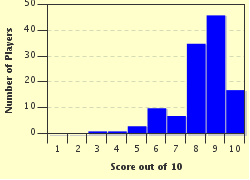Quiz Answer Key and Fun Facts
1. On the morning before her final exam, Rita was talking with Sadie about how nervous she was. She had not performed well on tests the whole semester and was on the borderline between passing and failing the course. "Oh, well", Rita resignedly said, "Zero hour is quickly approaching".
What did she mean by "zero hour"?
2. Eleanor sat dejected in her office. When Lucy asked her why she seemed so melancholy, Eleanor replied that she had chosen the wrong strategy for presenting the services their company offered and a potential client chose another company. Lucy remarked, "It looks like you . . .".
What cliche would you use to complete what Lucy said to Eleanor about Eleanor's choice?
3. According to an old metaphorical proverb, "zeal without knowledge is" what?
4. Sitting in her economics class, Michelle began to lose her concentration. She stared at one blank spot on a wall of the classroom, and soon she was no longer even aware of the professor's voice.
What particular idiom is used to explain what Michelle has done?
5. Prudence invited me to dinner at her family's house. Then she explained to me that a meal time there was "like feeding time at the zoo". I hesitated before accepting her invitation, for I was unclear as to whether she was making a positive or negative point about her family.
What did Prudence mean by "like feeding time at the zoo"?
6. One of the earliest written records of this next cliche occurs in a United States Food and Drug Administration ban on the presence of heptachlor in food.
What is this phrase that refers to a policy that refuses to allow a substance or a specific behavior--no matter how miniscule?
7. During their conversation, Pam told Julia to "zip it".
What did Pam mean by "zip it"?
8. The idiomatic phrase "zoom in" or "zoom in on", meaning to bring something into a closer or magnified view, comes from the advent of zoom lenses created in the very late 1920s for use with cameras. However, the word "zoom" itself has a different and earlier origin.
How did the word "zoom" come into existence?
9. Molly Jones, a journalist, has zeroed in on the president's private life.
In other words, what is it that Molly has done?
10. As they were leaving Maxwell's, Rose said to Valerie, "I am going to go home and zonk out".
What was Rose going to do when she got home?
Source: Author
alaspooryoric
This quiz was reviewed by FunTrivia editor
ponycargirl before going online.
Any errors found in FunTrivia content are routinely corrected through our feedback system.

